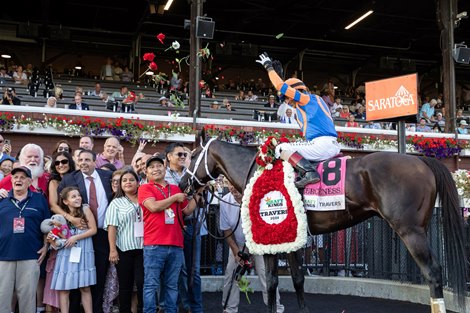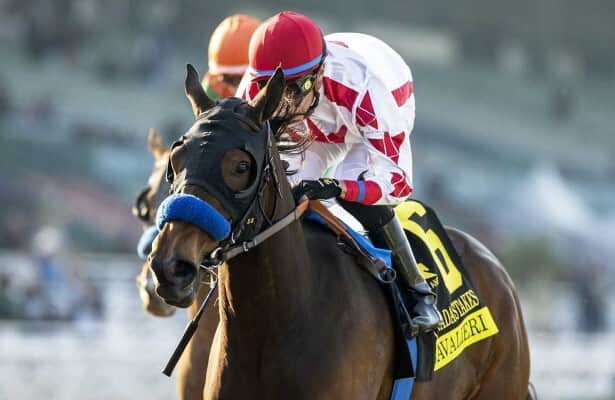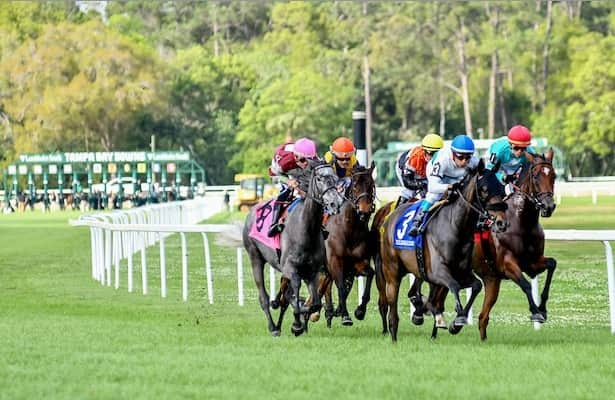The Breeders’ Cup Classic (G1) is the marquee race in North America in the second half of the year, a 1 1/4-mile test with a $7 million purse that goes a long way toward determining Horse of the Year.
This year will be the 41st edition of the Breeders’ Cup Classic. Much has changed in the sport of horse racing since the first edition in 1984, but history can guide us in multiple ways in terms of what to look for in a Classic winner.
I’ve compiled data on the last 25 editions of the race to try to identify helpful trends for picking the winner of this year’s edition Nov. 2 at Del Mar. Using the Breeders’ Cup Classics from 1999 to 2023, there are several points that jump out as significant.
Favorites winning more often
There have been some longshot winners of the Classic in the past 25 years, but seven favorites have won in the 20 editions since 2004 and the past nine winners (and 10 of the last 11) have been less than 5-1 odds. Seven of those nine winners were 7-2 odds or less. Simply put, you did not need to venture past the logical winners in recent years.
The average winning odds since 1999 for the Classic winner were 7.5-1 with a median of 4.4-1.
Impeccable recent form
Based on the trend above, it’s no surprise that recent Breeders’ Cup Classic winners have entered the race in tip-top form. Classic winners over the past 25 years have been exceptional in the five months leading up to the race—from June 1 through (but not including) the Breeders’ Cup Classic.
The past 25 Classic winners compiled a cumulative record of 46 wins from 79 starts for a 58.2% winning percentage and finished in the top three in 74 of those 79 races, good for 93.7%. The past 10 years have yielded even better results with 22 wins from 30 cumulative starts (73.3%) by Classic winners from June through their final prep races from 2014 to 2023. These horses finished first, second, or third in 28 of their 30 starts.
Furthermore, 16 of the 25 winners entered the Breeders’ Cup Classic off a win and Vino Rosso in 2019 crossed the finish line first in the Jockey Club Gold Cup (G1) but was disqualified and placed second. The past 11 winners either won their final prep or ran second, beaten by less than a length. Inconsistent racehorses just don’t win the Breeders’ Cup Classic.
Elite class
The last 20 winners of the race were all proven grade 1/group 1 winners. Twenty-three of the 25 already had a grade 1 win on their résumés and the other two were grade 2 winners.
The Breeders’ Cup Classic is not a spot for a breakout performance from a runner on the rise; it’s a race won by established stars.
New York, New York
Twelve of the past 25 Breeders’ Cup Classic winners made their final pre-World Championships start in New York, including five of the last nine. That surprised me a bit as only two of the 25 events were held in the state.
In fact, 11 of the last 25 Breeders’ Cups were held in California. If you remove the two held at Oak Tree at Santa Anita Park in 2008 and 2009—the only two editions in the last 25 years held on an all-weather surface—five of those nine California Breeders’ Cup Classics were won by horses who prepped in New York.
California is a clear second with seven winners, including five coming out of the race now called the California Crown Stakes (G1) (formerly the Goodwood then Awesome Again Stakes). The other six winners came from Kentucky (2), Europe, Pennsylvania, Maryland, and New Jersey.
Tactical speed, especially recently, is advantageous
Closers can and do win the Breeders’ Cup Classic—four in the past 25 years to be precise—but make no mistake, tactical speed has been a significant advantage in the 1 1/4-mile race. Eleven of the last 25 winners profiled as racehorses that preferred to race on or near the lead. Of the last dozen Breeders’ Cup Classic winners, six led after the opening quarter-mile and none was more than 3 1/2 lengths back at that point in the race. The last 12 were second or better in early stretch, so this race recently has not been won by horses rallying from way back.
On the dirt in California
Eleven of the last 25 editions of the Breeders’ Cup were held in California with nine at Santa Anita and two at Del Mar. If you remove the two held at Oak Tree at Santa Anita in 2008 and 2009—the only two editions in the last 25 years held on an all-weather surface—what do Breeders’ Cup Classic winners in California look like?
The oldest of the nine in this sample was won by Hall of Fame trainer Richard Mandella’s closer Pleasantly Perfect, a grade 2 winner who was victorious in 2003. The last eight (2012, 2013, 2014, 2016, 2017, 2019, 2021, 2023) were won by proven grade 1 winners and all were won by horses that were within 2 1/2 lengths of the front after the first half-mile with four of the eight setting the pace. The last seven of this group finished first in their final Breeders’ Cup prep, although Vino Rosso, as mentioned above, was disqualified and placed second in the 2019 Jockey Club Gold Cup.
a live longshot?
Unfortunately for longshot players, this race has not been a hotbed for upsets with only seven $20+ winners since 1999—and four of those came in the first five years of the 25-year sample.
There have been only three $20 winners since 2004 and one of them, Raven’s Pass in 2008, was an accomplished European invader who won the race during one of the two events held on an all-weather surface. Potential avenues for value are: three of the seven $20 winners were 3-year-olds, three of the seven were closers or closer/stalker types, and four placed (top three) but did not win their final prep race.
Odds and ends
It takes a fast racehorse to win the Breeders’ Cup Classic, no shock given the gravity and prestige of the marquee race of the World Championships. The average winning Equibase Speed Figure for the winner from 1999-2023 was 121.1 with a median of 120, with a range of 113-130. A quality 3-year-old is a viable win candidate with eight of the last 25 editions, or 32%, won by 3-year-olds facing older horses.
Most Likely 2024 Winners
I would imagine Travers Stakes (G1) winner Fierceness and European invader City of Troy will be the top-two betting choices with Japanese invaders Forever Young and Ushba Tesoro perhaps not too far behind. Of these four, Fierceness stands out.
History would suggest Fierceness has a great shot to win. He’s a champion with three grade 1 wins to his credit in terrific form with victories in both of his starts since the start of June. He’s a 3-year-old with tactical speed who enters off a win in New York Aug. 24 in the Travers at this 1 1/4-mile distance.
I’m less confident in City of Troy despite multiple positive trends because this will be his first start on a dirt main track. Raven’s Pass on the all-weather surface in 2008 is the lone European winner over the last 25 years, although Arcangues in 1993 authored the greatest upset in the history of the World Championships at 133.60-1 odds in his first start on dirt.
City of Troy is a Kentucky-bred 3-year-old by 2018 Triple crown winner Justify , he has won three group 1 races since the start of June with no defeats, and boasts some tactical speed. The cruising speed he’s shown to date is probably a far cry from the type of early speed he would need on dirt to be within a few lengths early in the Classic. I’m hesitant to take a short price on a horse trying something for the first time, in this case racing on dirt against the best dirt routers in the world.
Forever Young finished third in the Kentucky Derby (G1) in May and won his first start since then Oct. 2 in the Japan Dirt Classic. He’s not won at the grade 1/group 1 level and did not show in the Kentucky Derby the tactical speed that helped him win the United Arab Emirates Derby (G2) in March. Still, he finished third by a head in a gutsy race at Churchill Downs. The Kentucky Derby was his lone defeat in seven career starts and he was bumped steadily in the stretch run. I’m a little worried that he might be closer to the back of the pack than within a few lengths of the pace, but I think his class is established despite the lack of a top-level win on his résumé.
Ushba Tesoro won the 2023 Dubai World Cup among three group 1 victories and finished second in his most recent start, so he checks the class and form boxes. His lack of early speed hurt his chances last year in the Classic when he was fifth and entered the race on a six-race winning streak. He’s finished second in all three of his races this year. I believe Ushba Tesoro could win the Breeders’ Cup Classic, but I would need a big price to back him, so he might fit more of the longshot mold in my view.
Likewise, I would want value to back Sierra Leone to win. He’s a grade 1-winning 3-year-old closer with two wins, two seconds, and two thirds in six races. He enters off a third in the Travers and has not won any of his past four races. He also tends to be over-bet.
Highland Falls has two wins and one second in his three starts since June. The Kentucky-bred colt by two-time Horse of the Year Curlin out of 2006 Breeders’ Cup Distaff (G1) winner Round Pond enters out of a grade 1 win in New York, taking the Jockey Club Gold Cup by four lengths at this 1 1/4-mile distance. He’s shown more tactical speed with experience and he’s the best he’s ever been. I think he’s a strong win contender if you are looking beyond the obvious entrants.
Newgate earned his first grade 1 win in March for Hall of Fame trainer Bob Baffert and was third by a head Sept. 28 in the grade 1 California Crown, earning a 122 Equibase Speed Figure. That was his lone start since an unplaced finish in the Dubai World Cup in March and this 4-year-old with tactical speed could improve in his second start off the extended layoff at what figures to be a solid price.












